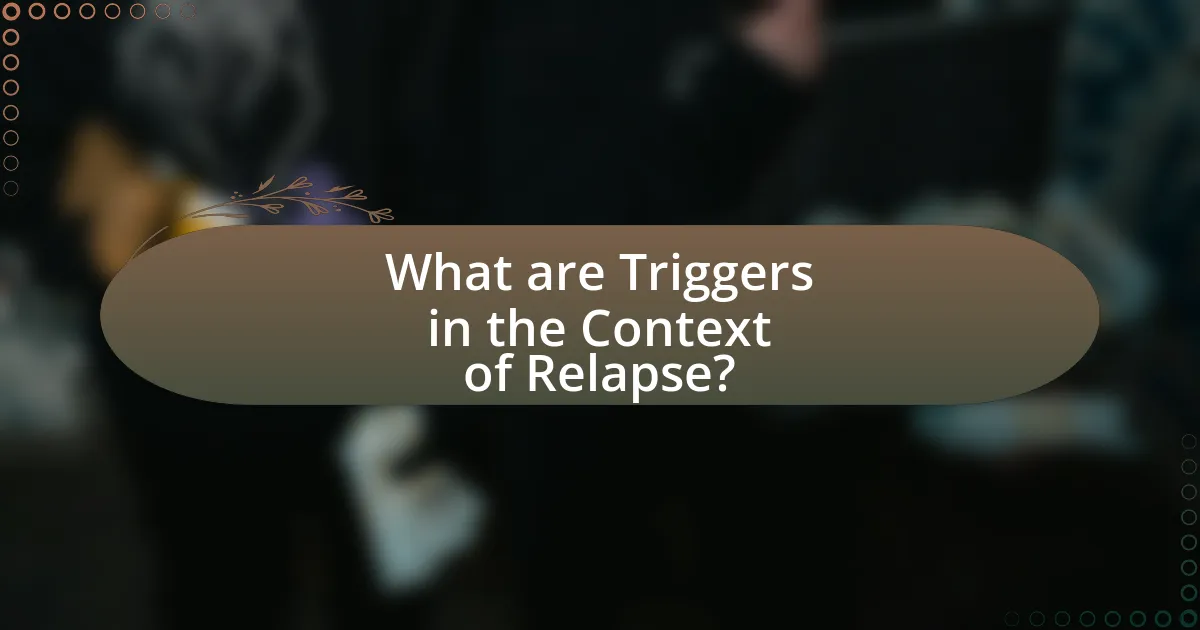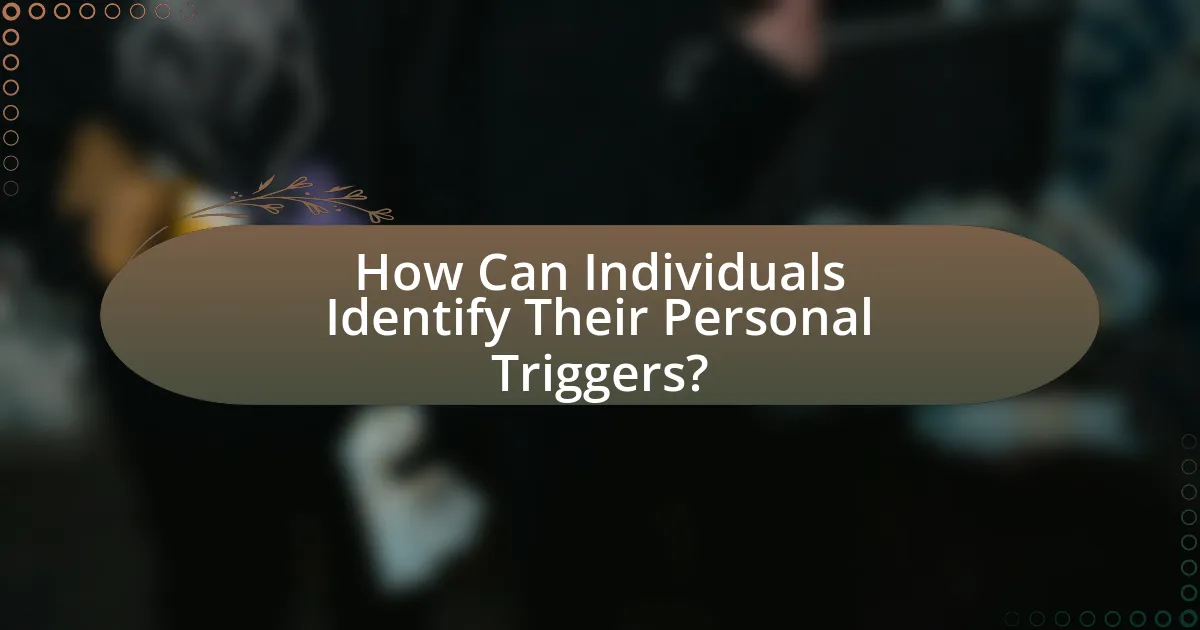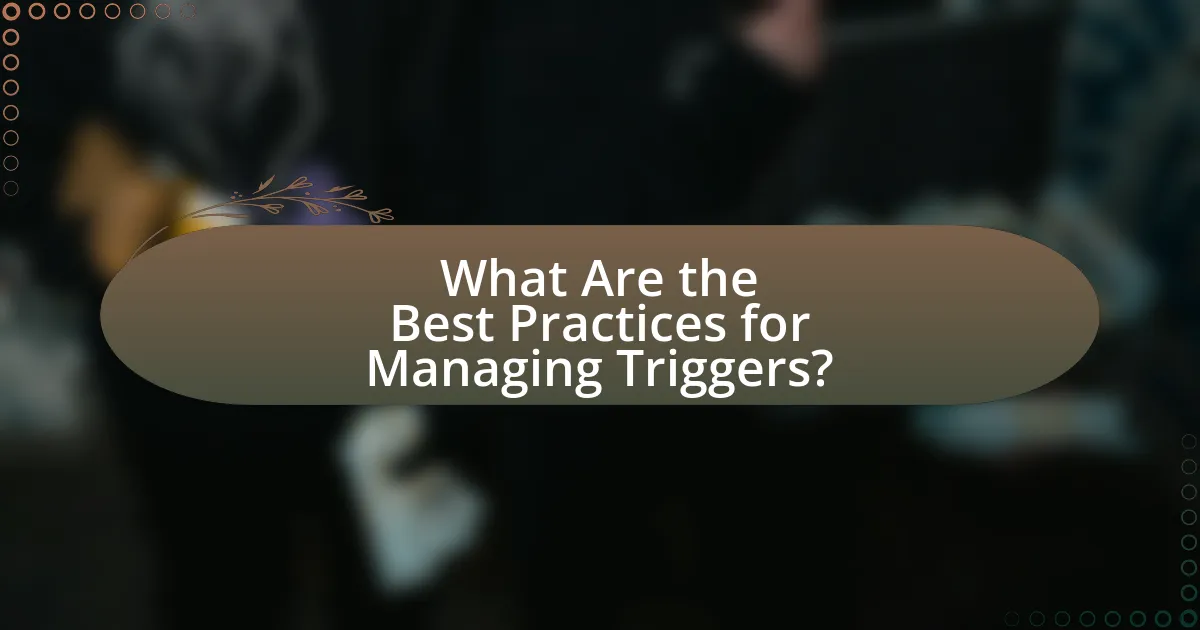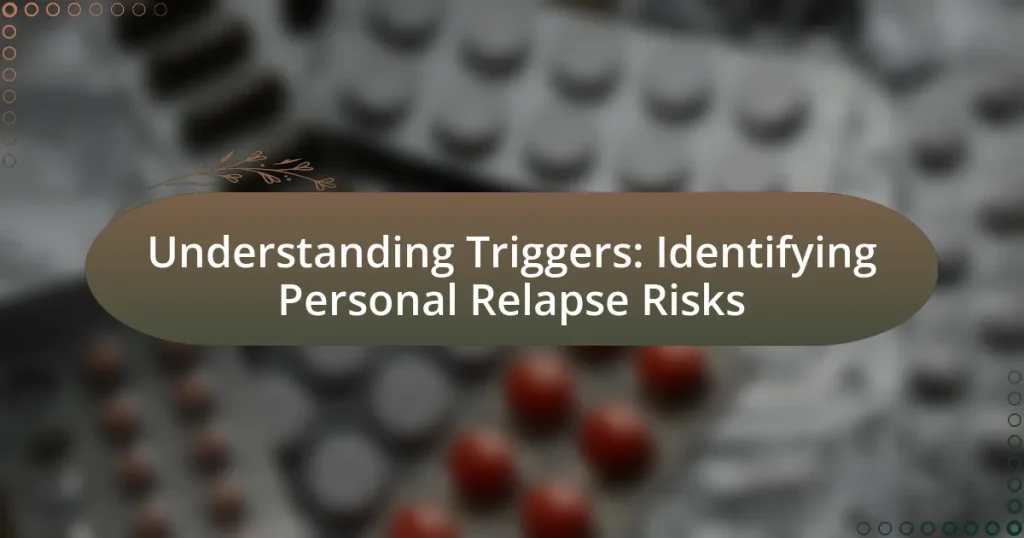Triggers are specific stimuli or situations that provoke cravings or urges to return to substance use or harmful behaviors, significantly influencing relapse behavior. This article explores the types of triggers—internal, external, and social—and their impact on recovery, emphasizing the importance of understanding and managing these triggers to prevent relapse. It discusses strategies for identifying personal triggers, including journaling, mindfulness practices, and support systems, while highlighting the role of therapy and educational resources in enhancing trigger awareness. By recognizing and addressing triggers, individuals can develop effective coping strategies that support long-term recovery and reduce the likelihood of relapse.

What are Triggers in the Context of Relapse?
Triggers in the context of relapse are specific stimuli or situations that provoke cravings or urges to return to substance use or harmful behaviors. These triggers can be emotional, environmental, or social, and they often remind individuals of past experiences associated with their addiction. Research indicates that understanding and identifying these triggers is crucial for developing effective relapse prevention strategies, as they can significantly influence an individual’s likelihood of relapse. For example, a study published in the journal “Addiction” by Sinha et al. (2011) highlights how stress and exposure to drug-related cues can activate cravings, underscoring the importance of recognizing personal triggers in recovery efforts.
How do Triggers Influence Relapse Behavior?
Triggers significantly influence relapse behavior by activating cravings and emotional responses associated with past substance use. When individuals encounter specific stimuli, such as people, places, or situations linked to their previous substance use, these triggers can elicit strong urges to relapse. Research indicates that approximately 40-60% of individuals recovering from addiction experience relapse, often due to these environmental and emotional triggers. For instance, a study published in the journal “Addiction” by Sinha (2001) highlights that stress and exposure to drug-related cues can lead to increased cravings and a higher likelihood of relapse. Thus, understanding and managing triggers is crucial for maintaining recovery and preventing relapse.
What Types of Triggers Exist?
There are three main types of triggers: internal triggers, external triggers, and social triggers. Internal triggers are emotional or psychological states that prompt cravings or urges, such as stress, anxiety, or depression. External triggers are environmental cues that can lead to relapse, including places, people, or situations associated with past substance use. Social triggers involve interactions with others that may encourage or provoke a desire to engage in substance use, such as peer pressure or social gatherings. Understanding these types of triggers is crucial for identifying personal relapse risks and developing effective coping strategies.
How Do Emotional Triggers Contribute to Relapse?
Emotional triggers significantly contribute to relapse by evoking intense feelings that can lead individuals to revert to previous unhealthy behaviors. When individuals experience stress, anxiety, or sadness, these emotions can activate cravings for substances or behaviors previously used as coping mechanisms. Research indicates that approximately 90% of relapses are linked to emotional distress, highlighting the critical role emotions play in recovery. Understanding and managing these emotional triggers is essential for maintaining long-term sobriety and preventing relapse.
Why is Understanding Triggers Important for Recovery?
Understanding triggers is crucial for recovery because they are specific stimuli that can provoke cravings or relapse in individuals. Recognizing these triggers allows individuals to develop coping strategies and avoid situations that may lead to relapse. Research indicates that approximately 70% of individuals in recovery experience cravings triggered by environmental cues, emotional states, or social interactions. By identifying and understanding these triggers, individuals can create a personalized recovery plan that enhances their resilience and reduces the likelihood of relapse.
How Can Identifying Triggers Aid in Preventing Relapse?
Identifying triggers aids in preventing relapse by enabling individuals to recognize and manage situations that may lead to a return to unhealthy behaviors. When individuals understand their specific triggers—such as stress, social situations, or emotional states—they can develop coping strategies to avoid or confront these triggers effectively. Research indicates that individuals who actively identify and address their triggers are less likely to experience relapse; for instance, a study published in the Journal of Substance Abuse Treatment found that participants who engaged in trigger identification and management reported a 30% reduction in relapse rates compared to those who did not. This proactive approach empowers individuals to maintain their recovery by fostering awareness and resilience against potential setbacks.
What Role Do Triggers Play in Long-Term Recovery?
Triggers play a critical role in long-term recovery by influencing an individual’s likelihood of relapse. These triggers can be emotional, environmental, or social cues that provoke cravings or remind individuals of past substance use. Research indicates that understanding and identifying personal triggers is essential for developing effective coping strategies, which can significantly reduce the risk of relapse. For instance, a study published in the Journal of Substance Abuse Treatment found that individuals who actively recognized and managed their triggers had a 50% lower relapse rate compared to those who did not. This highlights the importance of trigger awareness in maintaining sustained recovery.

How Can Individuals Identify Their Personal Triggers?
Individuals can identify their personal triggers by maintaining a detailed journal that records their emotional responses to various situations. This practice allows individuals to recognize patterns in their feelings and behaviors, which can reveal specific stimuli that provoke negative reactions or cravings. Research indicates that self-monitoring techniques, such as journaling, significantly enhance self-awareness and emotional regulation, making it easier to pinpoint triggers. For example, a study published in the Journal of Substance Abuse Treatment found that individuals who tracked their emotions and situations were better equipped to identify and manage their triggers, leading to improved outcomes in relapse prevention.
What Strategies Can Help in Recognizing Triggers?
To recognize triggers effectively, individuals can employ strategies such as maintaining a detailed journal of emotions and situations, practicing mindfulness to enhance self-awareness, and identifying patterns in behavior that precede cravings or relapses. Journaling allows individuals to document specific instances that lead to emotional responses, thereby highlighting potential triggers. Mindfulness practices, such as meditation, help individuals become more attuned to their thoughts and feelings, making it easier to spot triggers as they arise. Additionally, analyzing past experiences can reveal consistent patterns, enabling proactive management of situations that may lead to relapse. These strategies are supported by psychological research indicating that self-monitoring and increased awareness significantly improve the ability to identify and manage triggers.
How Can Journaling Assist in Trigger Identification?
Journaling assists in trigger identification by providing a structured method for individuals to reflect on their thoughts, emotions, and behaviors over time. This practice allows individuals to document specific situations that lead to cravings or negative emotions, creating a clear record of patterns and correlations. Research indicates that reflective writing can enhance self-awareness, enabling individuals to recognize their triggers more effectively. For instance, a study published in the Journal of Clinical Psychology found that expressive writing significantly improved emotional regulation and self-reflection, which are crucial for identifying personal relapse risks.
What Role Does Self-Reflection Play in Understanding Triggers?
Self-reflection plays a crucial role in understanding triggers by enabling individuals to analyze their thoughts, emotions, and behaviors in relation to specific situations. This introspective process helps identify patterns that lead to emotional responses or relapse, allowing for greater awareness of personal vulnerabilities. Research indicates that self-reflection can enhance emotional intelligence, which is essential for recognizing and managing triggers effectively. For instance, a study published in the Journal of Clinical Psychology found that individuals who engaged in regular self-reflection reported a better understanding of their emotional triggers and improved coping strategies. Thus, self-reflection serves as a foundational tool for individuals seeking to navigate their triggers and reduce the risk of relapse.
How Can Support Systems Aid in Identifying Triggers?
Support systems can aid in identifying triggers by providing external perspectives and emotional support that enhance self-awareness. These systems, which may include friends, family, or professional counselors, can observe behaviors and patterns that individuals may overlook, thus facilitating the recognition of specific situations or emotions that lead to relapse. Research indicates that social support significantly contributes to recovery outcomes, as highlighted in a study by Kelly et al. (2011) published in the Journal of Substance Abuse Treatment, which found that individuals with strong support networks are better at identifying and managing their triggers.
What Types of Support Groups Focus on Trigger Awareness?
Support groups that focus on trigger awareness include addiction recovery groups, mental health support groups, and trauma-focused groups. These groups provide a platform for individuals to share experiences and strategies related to their specific triggers, helping members to identify and manage their personal relapse risks. For instance, Alcoholics Anonymous (AA) emphasizes understanding triggers to prevent relapse, while groups like the National Alliance on Mental Illness (NAMI) offer support for individuals dealing with mental health challenges, including recognizing emotional triggers.
How Can Therapy Help Individuals Identify Their Triggers?
Therapy can help individuals identify their triggers by providing a structured environment for self-exploration and reflection. Through techniques such as cognitive-behavioral therapy (CBT), individuals learn to recognize patterns in their thoughts and behaviors that lead to emotional responses. Research indicates that CBT can effectively enhance self-awareness, allowing individuals to pinpoint specific situations, emotions, or thoughts that trigger unwanted behaviors or feelings. For instance, a study published in the Journal of Consulting and Clinical Psychology found that CBT significantly improved participants’ ability to identify and manage their triggers, leading to better emotional regulation and reduced relapse rates.

What Are the Best Practices for Managing Triggers?
The best practices for managing triggers include identifying specific triggers, developing coping strategies, and creating a supportive environment. Identifying triggers involves recognizing situations, emotions, or people that lead to cravings or relapse, which is essential for effective management. Developing coping strategies, such as mindfulness techniques or distraction methods, helps individuals respond to triggers without resorting to unhealthy behaviors. Creating a supportive environment entails surrounding oneself with positive influences and avoiding high-risk situations, which significantly reduces the likelihood of encountering triggers. Research indicates that individuals who actively engage in these practices are more successful in maintaining long-term recovery and reducing relapse rates.
How Can Individuals Develop Coping Strategies for Triggers?
Individuals can develop coping strategies for triggers by identifying specific triggers and implementing tailored responses. Recognizing personal triggers, such as stressors or environmental cues, allows individuals to anticipate and manage their reactions effectively. Techniques such as mindfulness, deep breathing, and cognitive restructuring can help mitigate the emotional response to these triggers. Research indicates that individuals who practice mindfulness report a 30% reduction in anxiety and stress levels, which supports the effectiveness of these strategies in managing triggers. Additionally, engaging in regular physical activity has been shown to improve mood and resilience, further aiding in the development of coping mechanisms.
What Techniques Can Help in Managing Emotional Triggers?
Techniques that can help in managing emotional triggers include mindfulness practices, cognitive restructuring, and emotional regulation strategies. Mindfulness practices, such as meditation and deep breathing, allow individuals to become aware of their emotional responses and create space for thoughtful reactions rather than impulsive ones. Cognitive restructuring involves identifying and challenging negative thought patterns that contribute to emotional triggers, thereby promoting healthier perspectives. Emotional regulation strategies, such as journaling or engaging in physical activity, provide constructive outlets for processing emotions. Research indicates that these techniques can significantly reduce the intensity of emotional responses and improve overall emotional resilience, as evidenced by studies in psychological journals that highlight their effectiveness in therapeutic settings.
How Can Mindfulness Practices Assist in Trigger Management?
Mindfulness practices assist in trigger management by enhancing self-awareness and emotional regulation. These practices, such as meditation and focused breathing, enable individuals to recognize their emotional responses to triggers without immediate reaction. Research indicates that mindfulness can reduce reactivity to stressors, as evidenced by a study published in the journal “Psychological Science,” which found that participants who engaged in mindfulness training showed decreased emotional reactivity and improved coping strategies. By fostering a non-judgmental awareness of thoughts and feelings, mindfulness equips individuals with the tools to manage triggers effectively, ultimately reducing the likelihood of relapse.
What Resources Are Available for Ongoing Trigger Management?
Resources available for ongoing trigger management include therapy, support groups, self-help books, and mobile applications. Therapy, particularly cognitive-behavioral therapy (CBT), helps individuals identify and manage triggers effectively, as evidenced by studies showing its efficacy in reducing relapse rates. Support groups, such as those offered by Alcoholics Anonymous or Narcotics Anonymous, provide community support and shared experiences, which are crucial for ongoing management. Self-help books, like “The Recovery Book” by Al Mooney, offer strategies and insights for recognizing and coping with triggers. Additionally, mobile applications like “Sober Grid” and “I Am Sober” provide tools for tracking triggers and connecting with others in recovery, enhancing accountability and support.
How Can Educational Workshops Enhance Trigger Awareness?
Educational workshops can enhance trigger awareness by providing participants with structured learning environments that facilitate the identification and understanding of personal triggers. These workshops often include interactive activities, discussions, and expert-led sessions that help individuals recognize their specific emotional and situational triggers, which are critical for preventing relapse. Research indicates that educational interventions can significantly improve self-awareness and coping strategies; for example, a study published in the Journal of Substance Abuse Treatment found that participants who attended workshops reported a 30% increase in their ability to identify triggers compared to those who did not participate. This evidence supports the effectiveness of educational workshops in fostering a deeper understanding of personal relapse risks.
What Online Tools Can Support Trigger Management Efforts?
Online tools that can support trigger management efforts include mobile applications, online therapy platforms, and digital journaling tools. Mobile applications like “Sober Grid” and “I Am Sober” provide community support and tracking features that help individuals identify and manage triggers effectively. Online therapy platforms such as “BetterHelp” and “Talkspace” offer professional guidance and coping strategies tailored to personal triggers. Digital journaling tools like “Day One” allow users to document their thoughts and feelings, helping them recognize patterns related to their triggers. These tools are validated by user testimonials and studies indicating their effectiveness in supporting individuals in managing relapse risks.
What Practical Tips Can Help Prevent Relapse Related to Triggers?
To prevent relapse related to triggers, individuals should develop a personalized coping strategy that includes identifying specific triggers, creating a support network, and practicing mindfulness techniques. Identifying triggers allows individuals to recognize situations or emotions that may lead to relapse, enabling proactive management. Establishing a support network of friends, family, or support groups provides accountability and encouragement during challenging times. Mindfulness techniques, such as meditation or deep breathing exercises, help individuals stay grounded and reduce stress, which can mitigate the impact of triggers. Research indicates that individuals who actively engage in these strategies report lower relapse rates, highlighting their effectiveness in maintaining recovery.
